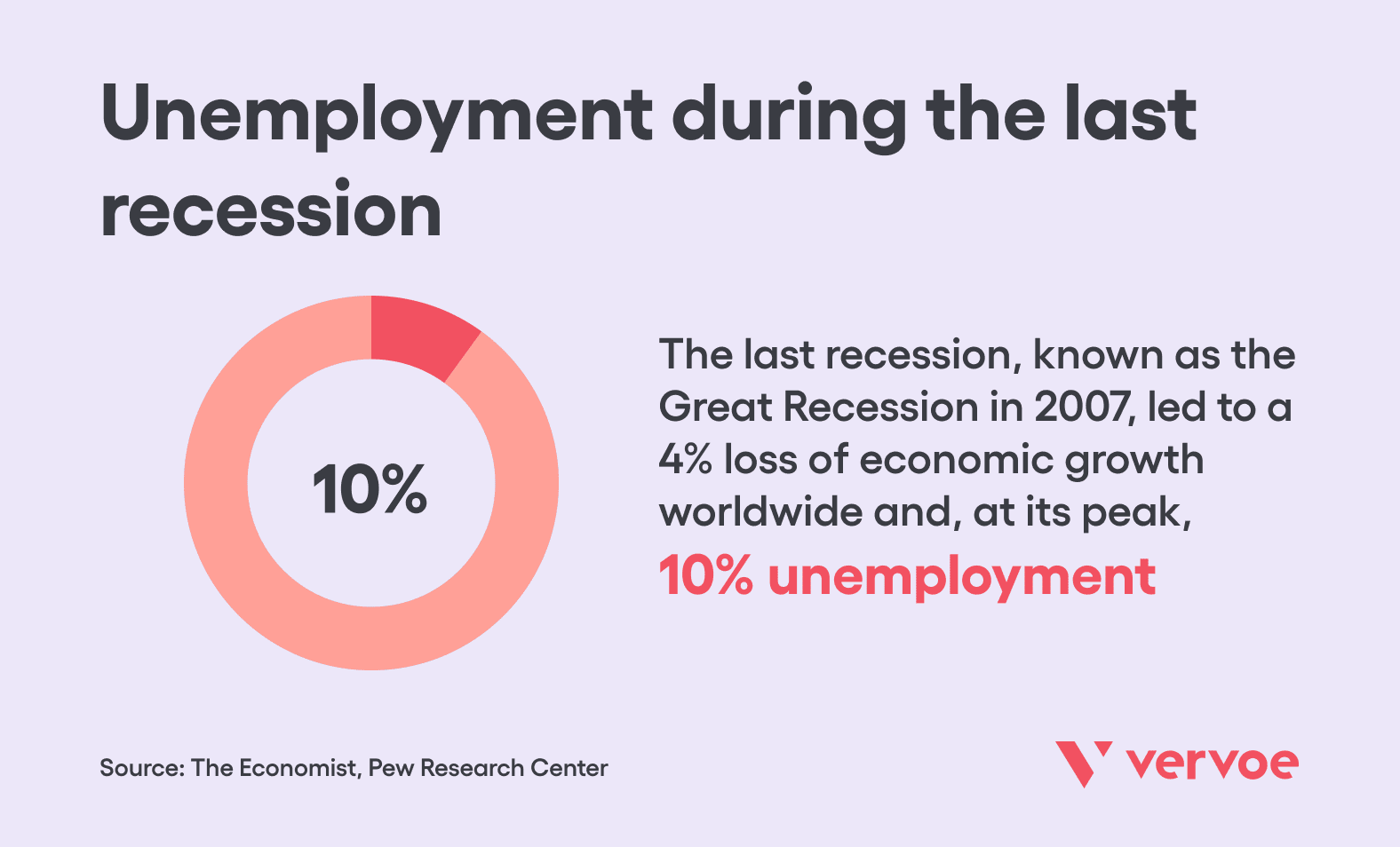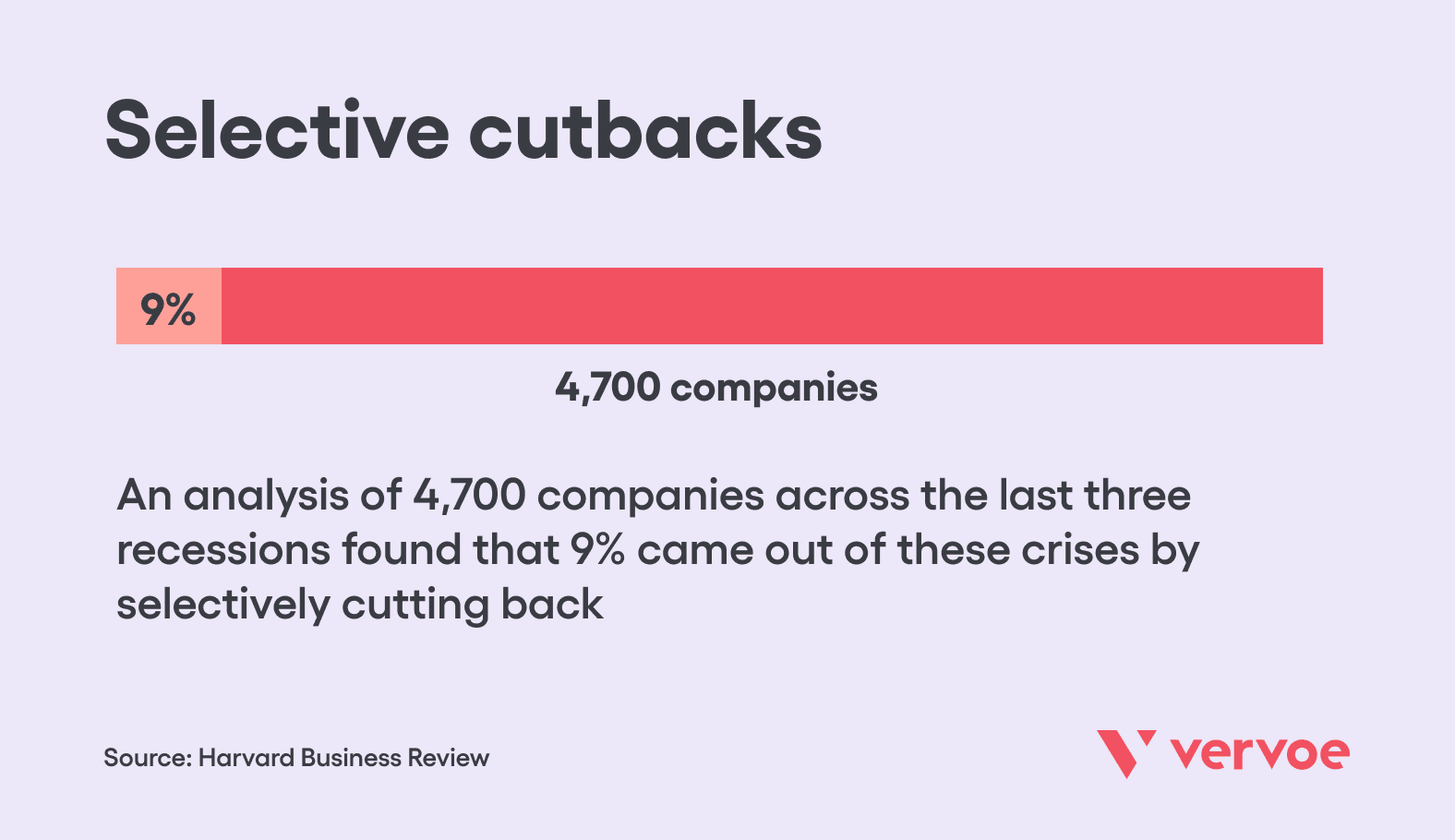It’s an interesting time to be in the job market. Following the great resignation, in which over 47 million Americans voluntarily quit their jobs, the economy began showing signs of “stagflation”. Rising inflation and other key indicators paint a complicated picture of the US economy, which is enough to spur fears of a recession — and impact the job market.
[Read more: 25 Emerging Recruitment Trends In 2021]
As economists struggle to make sense of conflicting data points, companies and hiring teams are moving to proactively build resilience into their hiring strategies. Just the idea of a looming recession is enough for many businesses to reexamine their approach to recruitment and make changes.
Whether or not a recession happens, adding some safety nets into your hiring process can help during a tightening labor market and give your company a competitive advantage if, and when, the time comes to cut costs.
Since the last economic downturn, active job seekers and employers alike have learned that hiring during a recession is a different ball game. Many businesses are watching the current market dynamic, taking those learnings, and implementing new strategies for hiring now and in the future.
Here are some things to consider about hiring during an economic downturn as you prepare for the next six months and beyond.
How does a recession affect hiring?
A recession is defined by economists as a period of significant decline in economic activity. Recessions are often characterized by drops in investment, falling profits for businesses, and rising unemployment. The last recession, known as the Great Recession in 2007, led to a 4% loss of economic growth worldwide and, at its peak, 10% unemployment.
It doesn’t take a recession, however, for companies to implement hiring freezes. During the COVID 19 pandemic, unemployment outpaced the Great Recession, reaching 14% and higher. When the economy shrinks, talent acquisition often grinds to a halt. Some companies even begin layoffs. The focus shifts from hiring to employee engagement and retention. Savvy business owners know that hiring a new team member is far more expensive than keeping an existing one.
During economic downturns, it can be tempting for employers to stop hiring altogether. However, those that continue to focus on recruiting core competencies are able to draw from a much bigger talent pool, finding candidates who may otherwise be off the market.

What should you NOT do in a recession?
Historically, companies that have continued to hire during a recession have been able to take advantage of the market. If you can, make it a priority to look for new hires during a possible recession — you may find the best talent is suddenly available.
There are many iconic companies that were able to take advantage of a recession as part of their hiring strategy. In the late 1940s, Hewlett-Packard took advantage of the engineers leaving the soon-to-close US military labs, hiring the best talent as many other organizations were beginning to struggle. Microsoft followed a similar strategy in the 1970s, hiring during one of the worst 16-month economic periods and just as the company was starting up.
However, many companies also need to recognize the reality of an economic downturn. Increasing hiring, or even sticking to business as usual, isn’t always financially viable.
Experts at Harvard Business Review identified a common thread among companies that were able to adjust their recruiting processes during tough economic times. An analysis of 4,700 companies across the last three recessions found that 9% came out of the crises by employing a “progressive focus.” These companies did cut back — but selectively.
Talent acquisition at these companies focused on long-term strategic goals. Rather than thinking in “either/or” terms — hiring or downsizing — these companies did both. They were able to retain employees in key positions, while also taking advantage of top talent willing to change their current jobs to gain security.

How do you recruit during a recession?
What does it mean to hire with a progressive focus?
First, take stock. Consider the resources you’ll need now and in the future. Some of the elements to consider include:
- Your company’s long-term goals: Can you aggressively move to find qualified candidates and take advantage of a favorable job market? What skills and expertise will your team need to continue innovating?
- Immediate hiring needs: What open positions do you currently have? Are those open positions high, medium, or low priority?
- Your ability to source candidates: During a recession, you may receive a higher volume of applications as candidates seek new work. Is your recruitment team equipped to handle more applications than usual?
Assess the status of your company and build a recruiting plan. A recruitment plan can help you determine when is a good time to initiate the hiring process. Signs like rapid growth in sales, employee burnout, and your own stress levels can indicate that your business is ready to invest in the recruiting process.
[Read more: Building A Recruitment Plan For Your Small Business]
Then, implement a few of the strategies listed below to make sure your recruiting process continues to deliver a great candidate experience, even though you may be strapped for resources and fielding inquiries from dozens (if not hundreds) of candidates at once.
6 strategies to help you hire effectively during a recession
Once you have a broad view of your future and current hiring goals, try implementing these strategies to help manage the recruitment process during an economic downturn or other disruption to the job market.
1. Conduct a skills gap analysis
A skills gap analysis can be used to use to identify a skill set your workforce needs but doesn’t necessarily have yet. Skills gap analyses can guide hiring priorities, create opportunities for training and development, or show you where to allocate funding for new technology or partnerships.
A skills gap report provides deeper insight into the talent that already exists within your company and considers the skills your company will need in the future. With this insight, your recruiting team can reach out to passive candidates, create more accurate job descriptions, and bring on new employees who can help you reach your long-term goals.
[Try our FREE Skills Gap Analysis Template to get started]
2. Check-in with passive candidates
Are there industry experts or senior leaders you would love to recruit, but who are working for other businesses? Now could be an excellent time to approach these people about joining your team.
Many employees consider changing jobs during a recession to gain a higher salary or more job security. The experts at Harvard Business Review suggest asking each member of your leadership team to think of three to five professionals with whom they would love to work. Then, rank this shortlist in terms of attractiveness to your company and agree on who to contact.
It’s possible that the right candidate is just waiting to be approached. Don’t be afraid to be aggressive with your recruiting outreach.
3. Create a task force to target a sector of the workforce
If you’re willing to hire at a high volume, consider setting up a task force that can specifically focus on bringing in the most promising new hires from target sectors.
Just as HP reached out to quality candidates exiting the military, you too may be able to take advantage of changes in the labor market to scoop up teams of active job seekers. Apple, for instance, aggressively hired developer and engineering talent following the downturn after 9/11; this enabled the business to release the first iPod and iPhone models.
4. Find tools to make screening easy
It’s possible that during difficult economic times you will have more demand than usual for an open role. This can quickly overwhelm your recruiters. Prepare for this by adding resources that allow you to hire at scale.
Vervoe is a screening tool that enables recruiters to identify the best candidates fast. Our skill assessments are designed to optimize your recruitment process at any hiring volume to find the right candidate for every role. Machine learning ranks the results of each assessment to deliver a shortlist of candidates who should be considered for the next round of vetting. Recruiters easily see which target candidate is worth spending more time interviewing.
5. Recruit remotely
Many business owners may believe they don’t have the resources to hire during a recession. However, you can have success by hiring remotely. Remote workers are often more affordable, cost less to hire and bring a diversity of skills to the table.
[Read more: How To Hire Remote Workers]
To fill an open position remotely, make sure you have the right tools in place. Remote interviewing software, for instance, can help you engage potential candidates and get a sense of their personalities. Many experts also encourage doing a remote reference check and providing remote onboarding resources to help new hires get up to speed quickly.
6. Continue developing in-house talent
Sourcing for an open position doesn’t necessarily mean externally hiring. You can develop your existing workers to take on new challenges. Training costs are often more affordable than hiring costs; consider which of your existing employees can be mentored to take on new roles with success.
Conclusion
High inflation, changing interest rates, and other variables are causing many industries to pause or plan ahead for a hiring freeze. When this happens, demand in the labor market can suddenly shift to favor employers. Don’t wait for boom times to fill your talent pipeline: businesses that take advantage of hiring during a recession can come out of hard times better prepared for the future.
When planning your recruiting strategy during a recession, think about ways to build resiliency into your workforce. If you fast forward to a year or five years following a recession, where do you want your company to be positioned? This can help guide your hiring process and ensure you’re taking advantage of the qualified candidates who may now be seeking new employment.
To learn more about hiring during a recession, check our webinar series on solving the skills shortage.




















